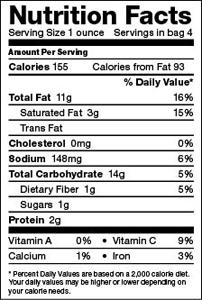Food Label Pitfalls
By • February 24, 2016 0 1408

Losing weight is one of the classic New Year’s resolutions, and eating better is an essential component of success. Food labels can be booby traps for dieters because they contain misleading information. Here are three of the most common pitfalls to step over.
1. Gluten-free. Even people with little or no nutrition education know that cookies aren’t very good for you. Made of refined starch and sugar and fat, they’re very calorie-dense. They’re also hyper-palatable, which means that it’s really hard to stop eating them. Everybody knows this. Food marketers, however, know that slapping “gluten-free” on a box of cookies is a way to bypass our common sense.
Gluten is a protein found in wheat (and in a few other grains) that helps gives bread its unique texture. It’s only a problem if you have a sensitivity. Gluten-free cookies are the nutritional equivalents of regular cookies because they’re, well, cookies. With or without gluten, they’re made of refined starch and sugar and fat. Healthy foods like chicken, eggs and green beans are all naturally gluten-free, but they’re not healthy because they’re gluten-free.
2. Trans-fat free. Trans-fats (from hydrogenated vegetable oil) might be the worst ingredients in our food today. We’ve become increasingly aware of their dangers, and the FDA introduced trans-fat labeling requirements with one exception: If a food has less than half a gram of trans-fats per serving, it can be legally called “trans-fat free” on the packaging. What’s more, on the nutrition label the trans-fat content can be rounded down to zero. This means that you can take a product that is almost pure hydrogenated vegetable oil (the source of trans-fats) and make the serving size so small that you can call it “trans-fat free.”
The takeaways for you, the consumer, are (a) be suspicious of anything labeled “trans-fat free” and (b) read the ingredient list and look for hydrogenated or partially hydrogenated oil of any kind — so you can avoid it.
3. “All natural” or “no artificial anything®.” These terms have no real legal definition, meaning that you can put “all natural” on a highly processed food without violating any law. As for the term “no artificial anything®,” please notice the registered trademark symbol. What the ® means is that this term is the intellectual property of the food manufacturer; the company has the exclusive right to use it for marketing and branding purposes. It does not mean that the term has any legal meaning regarding the contents of the package. (It doesn’t.)
A best-selling author and fitness expert, Josef Brandenburg owns True 180 Fitness in Georgetown. Information about his 14-Day Personal Training Experience may be found at true180.fitness.

